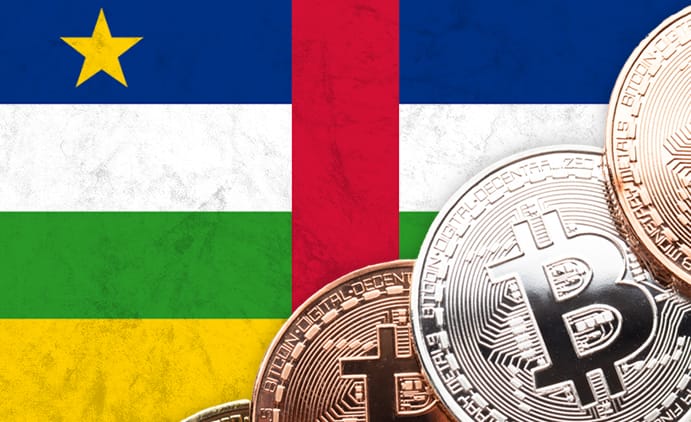The Central African Republic adopts bitcoin as legal tender
The Central African Republic (CAR) has adopted bitcoin as legal tender. Making CAR the first African country and the second country in the world to make the adoption—after El Salvador.

The Central African Republic (CAR) has adopted bitcoin as legal tender. Making CAR the first African country and the second country in the world to make the adoption—after El Salvador.
The nation’s Lawmakers jointly adopted the bill to make bitcoin legal tender alongside the CFA franc and also legalised the use of cryptocurrencies, and President Faustin Archange Touadera signed the measure into law, his chief of staff Obed Namsio said in a statement.
“The purpose of this law is to govern all transactions related to cryptocurrencies in the Central African Republic, without restriction...carried out by natural or legal persons, public or private," prescribes the text, which refers in particular to “online trading activities”, “all electronic transactions” or even “tax contributions”. The law also states that "exchanges in cryptocurrencies are not subject to tax", Namsio stated.
“The president supports this bill because it will improve the conditions of Central African citizens. It is a decisive step toward opening up new opportunities for our country” — Obed Namsio
Gourna Zacko, CAR’s Minister of Digital Economy and Calixte Nganongo, CAR's former Minister of Finance and Budget, both proposed the draft law which also seeks to establish a regulatory framework for the domestic cryptocurrency industry.
“With cryptocurrency, there is no more control of the Central Bank. You have your money, you send to an investor for a business, you receive it in any currency, you can dispose of with it in Dollar, Euro, CFA, or Naira,” Zacko said.
The volatility of bitcoin can be dizzying. By 2021, prices had soared more than 150% to an all-time high of $68,991, before collapsing by more than 30%. Even if the market has calmed down in 2022, the variations remain very strong: -17% in February, +8% in March and +10% in April. Bitcoin was trading on Wednesday at over $39,000.
The Central African Republic is one of six nations that use the Central African CFA franc, a regional currency governed by the Bank of Central African States (BEAC). A BEAC spokesperson told Reuters that “The BEAC learned at the same time as the public of the enactment of a new law on cryptocurrency in Central African Republic.” However, the source said that the bank did not have an official response yet.
The African nation which has gold and diamond reserves is yet one of the world’s poorest countries. Years of violent conflict and a political crisis that gripped the country in the lead up to presidential elections in December 2020 have had a severe impact on the economy and damaged relations with its international partners, leading to delays in the distribution of vital aid.
Internet penetration in the landlocked nation is about 11% of the 5 million population, according to DataReportal, an online data portal.
Related: What CBN’s new ban on crypto means for Nigerian users and the local industry
Crypto: a legal tender across Africa?
In Nigeria, the central bank barred local banks from working with cryptocurrencies last year before launching its own digital currency, the eNaira. The Central Bank of Nigeria (CBN) recently fined some commercial banks for failing to comply with regulations that bar customers from transacting in cryptocurrencies.
Aside from Nigeria, Cameroon, and Gabon have some forms of prohibition regarding crypto trading. Meanwhile, crypto trading has been banned in Algeria, Egypt, Morocco, and Tunisia.
In South Africa, regulators have been exploring the potential regulation of cryptocurrencies and other blockchain technology, and Tanzania's central bank said last year it was working on a presidential directive to prepare for cryptocurrencies.
While Africa still trails the rest of the world in crypto adoption, a Chainalysis' report on crypto in Africa said growth is evident. According to the report, the continent's cryptocurrency market has grown by almost 1200% in the last one year—more than any other region. This growth puts the local crypto ecosystem's value at $105.6 billion as at the time of the report.
How is “bitcoin as legal tender” faring in El Salvador?
El Salvador officially made Bitcoin legal tender in September 2021. However, a recent survey released by the Chamber of Commerce and Industry (CCI) of El Salvador reported that 86% of the businesses contacted said they had never conducted a transaction using Bitcoin.
“Regarding the role of bitcoin as legal tender and its impact on the performance of their businesses, 91.7% of the participants said that the implementation of bitcoin has been indifferent for their business; and 86% report that they have not made sales using the cryptoactive.” the survey stated.
According to the CCI of El Salvador, the aforementioned percentages are compared with only 3.6% of those surveyed who affirm that bitcoin has contributed to increasing their sales, and 13.9% who report having made sales in bitcoin.







Comments ()